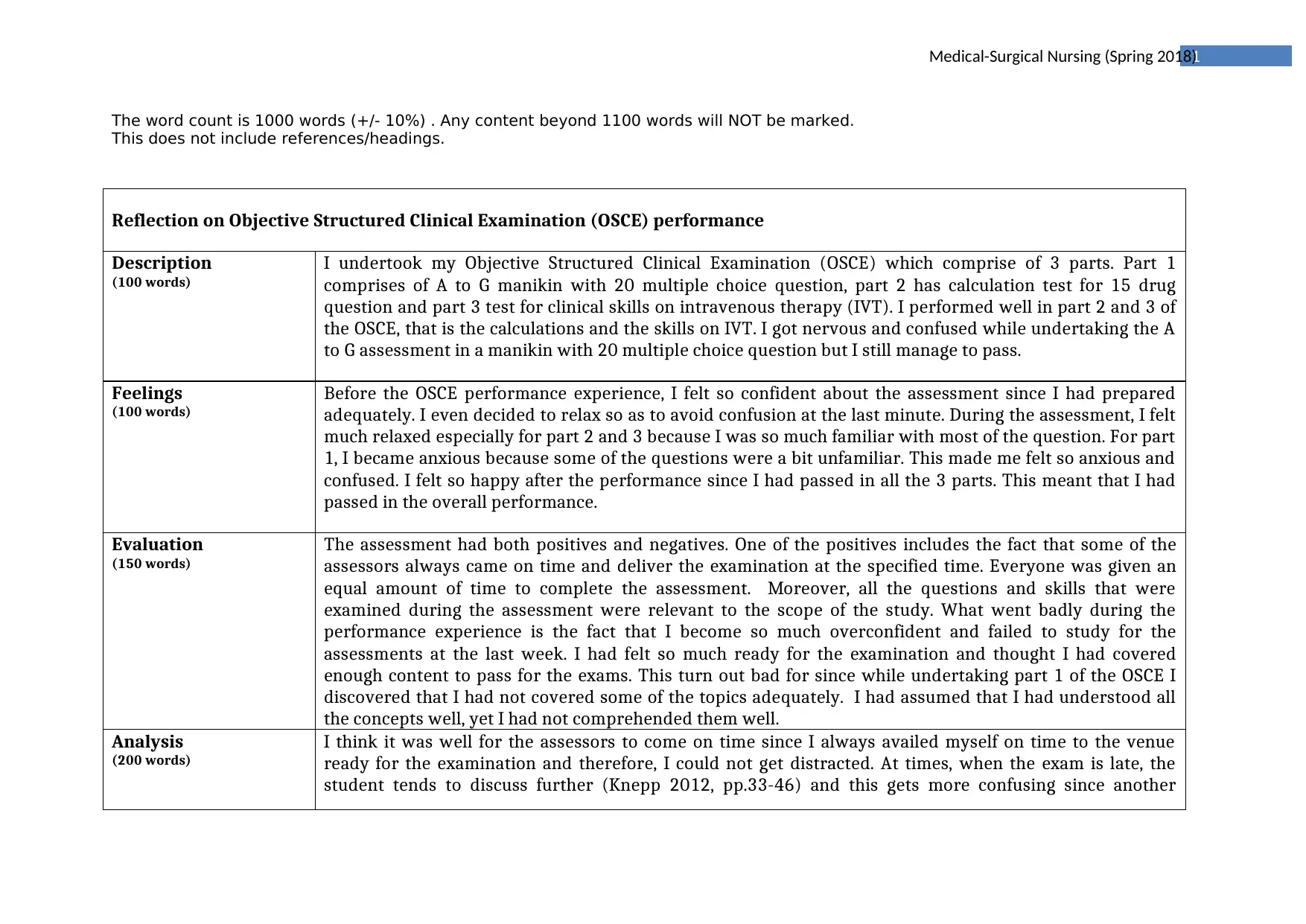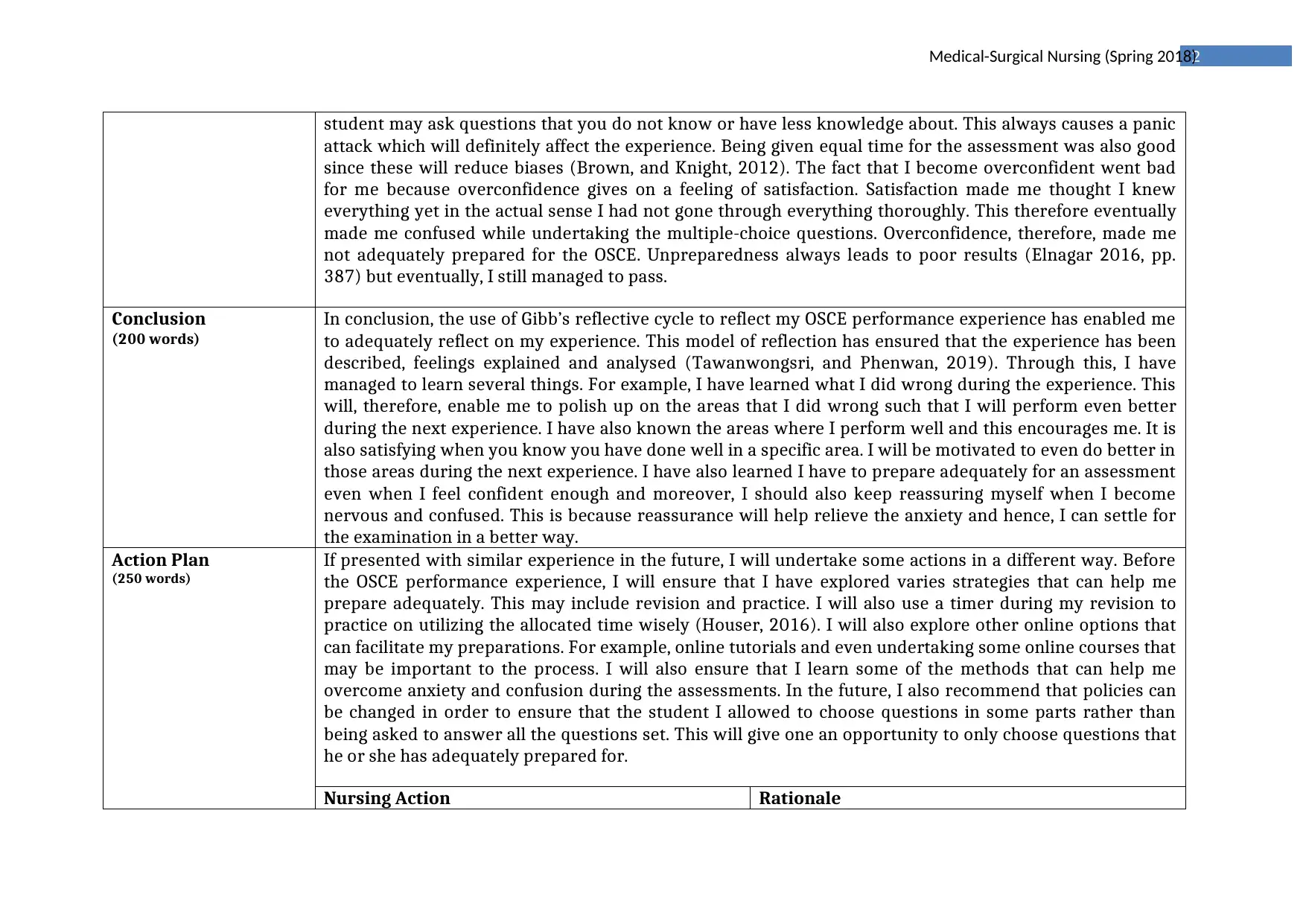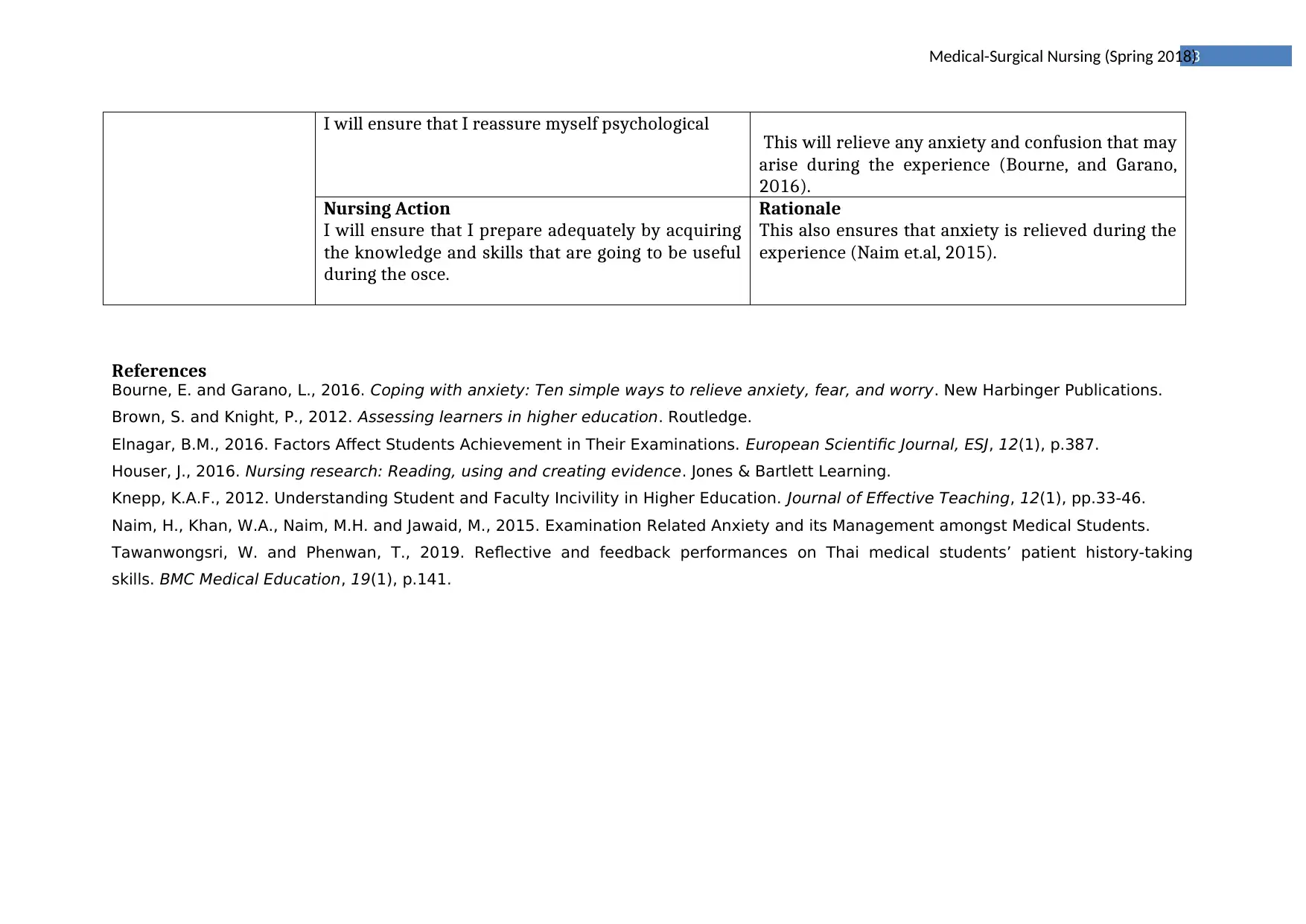Medical-Surgical Nursing (Spring 2018) OSCE Performance Reflection
VerifiedAdded on 2022/11/14
|3
|1315
|475
Report
AI Summary
This report is a reflection on a student's Objective Structured Clinical Examination (OSCE) performance in a Medical-Surgical Nursing course. The student utilized Gibb's reflective cycle to analyze their experience, including a description of the OSCE components (manikin assessment, drug calculations, and IVT skills), their feelings before, during, and after the assessment, and an evaluation of the positives and negatives. The analysis section explores factors like assessor punctuality, equal time allocation, and the impact of overconfidence on performance. The conclusion summarizes key learnings, such as the importance of thorough preparation and anxiety management. Finally, the report presents an action plan outlining strategies for future OSCEs, including revision, practice, and anxiety-reducing techniques, along with nursing actions and rationales supported by evidence-based literature.

1Medical-Surgical Nursing (Spring 2018)
The word count is 1000 words (+/- 10%) . Any content beyond 1100 words will NOT be marked.
This does not include references/headings.
Reflection on Objective Structured Clinical Examination (OSCE) performance
Description
(100 words)
I undertook my Objective Structured Clinical Examination (OSCE) which comprise of 3 parts. Part 1
comprises of A to G manikin with 20 multiple choice question, part 2 has calculation test for 15 drug
question and part 3 test for clinical skills on intravenous therapy (IVT). I performed well in part 2 and 3 of
the OSCE, that is the calculations and the skills on IVT. I got nervous and confused while undertaking the A
to G assessment in a manikin with 20 multiple choice question but I still manage to pass.
Feelings
(100 words)
Before the OSCE performance experience, I felt so confident about the assessment since I had prepared
adequately. I even decided to relax so as to avoid confusion at the last minute. During the assessment, I felt
much relaxed especially for part 2 and 3 because I was so much familiar with most of the question. For part
1, I became anxious because some of the questions were a bit unfamiliar. This made me felt so anxious and
confused. I felt so happy after the performance since I had passed in all the 3 parts. This meant that I had
passed in the overall performance.
Evaluation
(150 words)
The assessment had both positives and negatives. One of the positives includes the fact that some of the
assessors always came on time and deliver the examination at the specified time. Everyone was given an
equal amount of time to complete the assessment. Moreover, all the questions and skills that were
examined during the assessment were relevant to the scope of the study. What went badly during the
performance experience is the fact that I become so much overconfident and failed to study for the
assessments at the last week. I had felt so much ready for the examination and thought I had covered
enough content to pass for the exams. This turn out bad for since while undertaking part 1 of the OSCE I
discovered that I had not covered some of the topics adequately. I had assumed that I had understood all
the concepts well, yet I had not comprehended them well.
Analysis
(200 words)
I think it was well for the assessors to come on time since I always availed myself on time to the venue
ready for the examination and therefore, I could not get distracted. At times, when the exam is late, the
student tends to discuss further (Knepp 2012, pp.33-46) and this gets more confusing since another
The word count is 1000 words (+/- 10%) . Any content beyond 1100 words will NOT be marked.
This does not include references/headings.
Reflection on Objective Structured Clinical Examination (OSCE) performance
Description
(100 words)
I undertook my Objective Structured Clinical Examination (OSCE) which comprise of 3 parts. Part 1
comprises of A to G manikin with 20 multiple choice question, part 2 has calculation test for 15 drug
question and part 3 test for clinical skills on intravenous therapy (IVT). I performed well in part 2 and 3 of
the OSCE, that is the calculations and the skills on IVT. I got nervous and confused while undertaking the A
to G assessment in a manikin with 20 multiple choice question but I still manage to pass.
Feelings
(100 words)
Before the OSCE performance experience, I felt so confident about the assessment since I had prepared
adequately. I even decided to relax so as to avoid confusion at the last minute. During the assessment, I felt
much relaxed especially for part 2 and 3 because I was so much familiar with most of the question. For part
1, I became anxious because some of the questions were a bit unfamiliar. This made me felt so anxious and
confused. I felt so happy after the performance since I had passed in all the 3 parts. This meant that I had
passed in the overall performance.
Evaluation
(150 words)
The assessment had both positives and negatives. One of the positives includes the fact that some of the
assessors always came on time and deliver the examination at the specified time. Everyone was given an
equal amount of time to complete the assessment. Moreover, all the questions and skills that were
examined during the assessment were relevant to the scope of the study. What went badly during the
performance experience is the fact that I become so much overconfident and failed to study for the
assessments at the last week. I had felt so much ready for the examination and thought I had covered
enough content to pass for the exams. This turn out bad for since while undertaking part 1 of the OSCE I
discovered that I had not covered some of the topics adequately. I had assumed that I had understood all
the concepts well, yet I had not comprehended them well.
Analysis
(200 words)
I think it was well for the assessors to come on time since I always availed myself on time to the venue
ready for the examination and therefore, I could not get distracted. At times, when the exam is late, the
student tends to discuss further (Knepp 2012, pp.33-46) and this gets more confusing since another
Paraphrase This Document
Need a fresh take? Get an instant paraphrase of this document with our AI Paraphraser

2Medical-Surgical Nursing (Spring 2018)
student may ask questions that you do not know or have less knowledge about. This always causes a panic
attack which will definitely affect the experience. Being given equal time for the assessment was also good
since these will reduce biases (Brown, and Knight, 2012). The fact that I become overconfident went bad
for me because overconfidence gives on a feeling of satisfaction. Satisfaction made me thought I knew
everything yet in the actual sense I had not gone through everything thoroughly. This therefore eventually
made me confused while undertaking the multiple-choice questions. Overconfidence, therefore, made me
not adequately prepared for the OSCE. Unpreparedness always leads to poor results (Elnagar 2016, pp.
387) but eventually, I still managed to pass.
Conclusion
(200 words)
In conclusion, the use of Gibb’s reflective cycle to reflect my OSCE performance experience has enabled me
to adequately reflect on my experience. This model of reflection has ensured that the experience has been
described, feelings explained and analysed (Tawanwongsri, and Phenwan, 2019). Through this, I have
managed to learn several things. For example, I have learned what I did wrong during the experience. This
will, therefore, enable me to polish up on the areas that I did wrong such that I will perform even better
during the next experience. I have also known the areas where I perform well and this encourages me. It is
also satisfying when you know you have done well in a specific area. I will be motivated to even do better in
those areas during the next experience. I have also learned I have to prepare adequately for an assessment
even when I feel confident enough and moreover, I should also keep reassuring myself when I become
nervous and confused. This is because reassurance will help relieve the anxiety and hence, I can settle for
the examination in a better way.
Action Plan
(250 words)
If presented with similar experience in the future, I will undertake some actions in a different way. Before
the OSCE performance experience, I will ensure that I have explored varies strategies that can help me
prepare adequately. This may include revision and practice. I will also use a timer during my revision to
practice on utilizing the allocated time wisely (Houser, 2016). I will also explore other online options that
can facilitate my preparations. For example, online tutorials and even undertaking some online courses that
may be important to the process. I will also ensure that I learn some of the methods that can help me
overcome anxiety and confusion during the assessments. In the future, I also recommend that policies can
be changed in order to ensure that the student I allowed to choose questions in some parts rather than
being asked to answer all the questions set. This will give one an opportunity to only choose questions that
he or she has adequately prepared for.
Nursing Action Rationale
student may ask questions that you do not know or have less knowledge about. This always causes a panic
attack which will definitely affect the experience. Being given equal time for the assessment was also good
since these will reduce biases (Brown, and Knight, 2012). The fact that I become overconfident went bad
for me because overconfidence gives on a feeling of satisfaction. Satisfaction made me thought I knew
everything yet in the actual sense I had not gone through everything thoroughly. This therefore eventually
made me confused while undertaking the multiple-choice questions. Overconfidence, therefore, made me
not adequately prepared for the OSCE. Unpreparedness always leads to poor results (Elnagar 2016, pp.
387) but eventually, I still managed to pass.
Conclusion
(200 words)
In conclusion, the use of Gibb’s reflective cycle to reflect my OSCE performance experience has enabled me
to adequately reflect on my experience. This model of reflection has ensured that the experience has been
described, feelings explained and analysed (Tawanwongsri, and Phenwan, 2019). Through this, I have
managed to learn several things. For example, I have learned what I did wrong during the experience. This
will, therefore, enable me to polish up on the areas that I did wrong such that I will perform even better
during the next experience. I have also known the areas where I perform well and this encourages me. It is
also satisfying when you know you have done well in a specific area. I will be motivated to even do better in
those areas during the next experience. I have also learned I have to prepare adequately for an assessment
even when I feel confident enough and moreover, I should also keep reassuring myself when I become
nervous and confused. This is because reassurance will help relieve the anxiety and hence, I can settle for
the examination in a better way.
Action Plan
(250 words)
If presented with similar experience in the future, I will undertake some actions in a different way. Before
the OSCE performance experience, I will ensure that I have explored varies strategies that can help me
prepare adequately. This may include revision and practice. I will also use a timer during my revision to
practice on utilizing the allocated time wisely (Houser, 2016). I will also explore other online options that
can facilitate my preparations. For example, online tutorials and even undertaking some online courses that
may be important to the process. I will also ensure that I learn some of the methods that can help me
overcome anxiety and confusion during the assessments. In the future, I also recommend that policies can
be changed in order to ensure that the student I allowed to choose questions in some parts rather than
being asked to answer all the questions set. This will give one an opportunity to only choose questions that
he or she has adequately prepared for.
Nursing Action Rationale

3Medical-Surgical Nursing (Spring 2018)
I will ensure that I reassure myself psychological This will relieve any anxiety and confusion that may
arise during the experience (Bourne, and Garano,
2016).
Nursing Action
I will ensure that I prepare adequately by acquiring
the knowledge and skills that are going to be useful
during the osce.
Rationale
This also ensures that anxiety is relieved during the
experience (Naim et.al, 2015).
References
Bourne, E. and Garano, L., 2016. Coping with anxiety: Ten simple ways to relieve anxiety, fear, and worry. New Harbinger Publications.
Brown, S. and Knight, P., 2012. Assessing learners in higher education. Routledge.
Elnagar, B.M., 2016. Factors Affect Students Achievement in Their Examinations. European Scientific Journal, ESJ, 12(1), p.387.
Houser, J., 2016. Nursing research: Reading, using and creating evidence. Jones & Bartlett Learning.
Knepp, K.A.F., 2012. Understanding Student and Faculty Incivility in Higher Education. Journal of Effective Teaching, 12(1), pp.33-46.
Naim, H., Khan, W.A., Naim, M.H. and Jawaid, M., 2015. Examination Related Anxiety and its Management amongst Medical Students.
Tawanwongsri, W. and Phenwan, T., 2019. Reflective and feedback performances on Thai medical students’ patient history-taking
skills. BMC Medical Education, 19(1), p.141.
I will ensure that I reassure myself psychological This will relieve any anxiety and confusion that may
arise during the experience (Bourne, and Garano,
2016).
Nursing Action
I will ensure that I prepare adequately by acquiring
the knowledge and skills that are going to be useful
during the osce.
Rationale
This also ensures that anxiety is relieved during the
experience (Naim et.al, 2015).
References
Bourne, E. and Garano, L., 2016. Coping with anxiety: Ten simple ways to relieve anxiety, fear, and worry. New Harbinger Publications.
Brown, S. and Knight, P., 2012. Assessing learners in higher education. Routledge.
Elnagar, B.M., 2016. Factors Affect Students Achievement in Their Examinations. European Scientific Journal, ESJ, 12(1), p.387.
Houser, J., 2016. Nursing research: Reading, using and creating evidence. Jones & Bartlett Learning.
Knepp, K.A.F., 2012. Understanding Student and Faculty Incivility in Higher Education. Journal of Effective Teaching, 12(1), pp.33-46.
Naim, H., Khan, W.A., Naim, M.H. and Jawaid, M., 2015. Examination Related Anxiety and its Management amongst Medical Students.
Tawanwongsri, W. and Phenwan, T., 2019. Reflective and feedback performances on Thai medical students’ patient history-taking
skills. BMC Medical Education, 19(1), p.141.
⊘ This is a preview!⊘
Do you want full access?
Subscribe today to unlock all pages.

Trusted by 1+ million students worldwide
1 out of 3
Your All-in-One AI-Powered Toolkit for Academic Success.
+13062052269
info@desklib.com
Available 24*7 on WhatsApp / Email
![[object Object]](/_next/static/media/star-bottom.7253800d.svg)
Unlock your academic potential
Copyright © 2020–2025 A2Z Services. All Rights Reserved. Developed and managed by ZUCOL.

